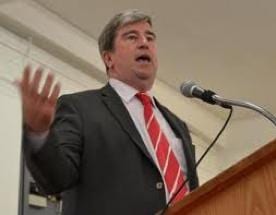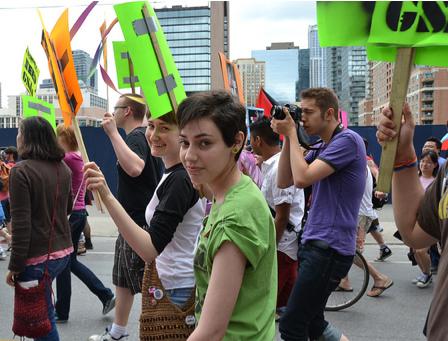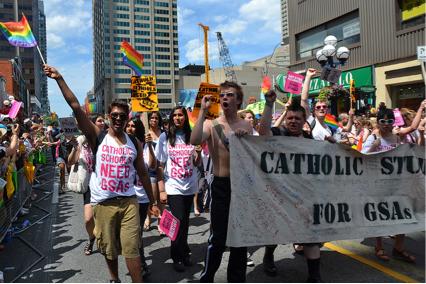
MPP Glen Murray. Credit: Andrea Houston

Leanne Iskander marching with Catholic Students for GSAs during the StonewallTO march. Credit: Andrea Houston
The province is refusing to provide assurances on whether students will be allowed to use the word gay when forming gay-straight alliances in Ontario Catholic schools. It also won’t say whether the Pastoral Guidelines to Assist Students of Same-Sex Orientation, the bishops’ handbook for teachers, will be the reference guide.
Xtra has placed several calls to the Ontario Ministry of Education for clarification on Premier Dalton McGuinty’s announcement over Pride Week that the Ontario government will move to ensure that “gay, lesbian and trans support groups” are possible in every Ontario school – public and Catholic – in September.
On July 20, Toronto Centre MPP Glen Murray tweeted that the “premier announced that students will decide if schools have LGBT specific groups – GSA manual being distributed.”
That sparked a back-and-forth direct-message Twitter conversation that has since been deleted. Luckily, Xtra took screen shots. Murray did not respond to requests for a phone interview.
Murray tweeted to Xtra that a “GSA manual [has been] funded by Ontario [and] developed by Egale.”
Xtra asked when the manual will be distributed. But more specifically, does it state that students will be allowed to use the word gay in the names of new school clubs?
To this, Murray had no concrete answer.
Murray: “Well GAY is on the cover. [The manual has] not been released yet – I will let you know.”
The GSA manual is available for download on the mygsa.ca website.
Xtra: Okay, but in September, will the Ontario government mandate that students in Catholic schools be allowed to call a new group a “gay-straight alliance,” even if school administrators insist otherwise?
Up until now, Catholic schools have been adamant that clubs choose “Catholic names,” such as “Open Arms,” which is the name the St Joe’s group in Mississisauga was pressured to adopt.
Murray: “Don’t know yet. The vast majority will and 100 percent [of schools] will have a dedicated LGBT group – again, Catholic boards have constitutional rights.”
“In every school, students will decide on LGBT groups,” he added.
The manual includes information about how to start a GSA; scholarship resources for lesbian, gay, bisexual and trans students; summaries of legal cases fighting homophobia in Canada; and some statistics on queer youth bullying.
Helen Kennedy, Egale Canada’s executive director, was unavailable for comment.
GSA activist Christopher Mckerracher, who is one of more than 30 members in Mississauga’s St Joe’s unofficial GSA, has seen the manual and tells Xtra, “It looks pretty good, but it kind of felt like [Egale] is speaking for us, like telling students what to say” in starting a GSA. “It could have been better.”
As the most high-profile youth GSA activists in Ontario, Mckerracher was surprised none of the St Joe’s students were asked to contribute to the manual.
He will say this about document: “It is very detailed about things people would have questions about.”
Murray says his GSA working group is still meeting with lawyers, historians, trustees, trans activists and other MPPs, who are in the process of drafting “a legal constitutional case.”
On July 22, the Twitter debate continues, this time publicly.
Activist and founder of the St Joe’s unofficial GSA Leanne Iskander – who has been leading the St Joe’s group in a fight for GSAs in all schools since March – responds with a tweet asking Murray, “Will the Pastoral Guidelines still be used” to guide group discussion?
Ontario Catholic School Trustees’ Association president Nancy Kirby previously told Xtra that the groups will have a “Catholic perspective,” meaning the Pastoral Guidelines to Assist Students of Same-Sex Orientation will most likely be the main reference point for chaplains and guidance counsellors at group meetings.
The Pastoral Guidelines, developed by the bishops at the Institute for Catholic Education (ICE), reads that “gay” is not an identity, gay sex is “immoral and sinful” and gay people ought to live a life of “chastity.” It is the primary document for instructing school administrators and teachers on homosexuality.
Kirby was unavailable for comment on the latest announcement.
Iskander says the Pastoral Guidelines implies that gay is a choice. The Canadian Civil Liberties Association has condemned the document, and Queer Ontario has called it “homophobic from start to finish.”
Murray said that’s a decision that will likely be left to the boards. “We are really getting to the weeds. I would think that is within a school board’s jurisdiction.” He also couldn’t say whether a school chaplain would be present at all meetings.
At the board level, a committee of Catholic school officials has been meeting throughout the summer to create “a framework” for “anti-bullying groups.” Catholic school boards have refused Xtra’s requests for further details on the committee.
Kirby has said, “When I look at a gay-straight alliance, I see an activist group. We are answering the students’ request for support and assistance, not for activism. Students don’t want to become activists; they want to be supported in being bullied by their peers.”
Iskander told Xtra during Pride that she will believe it when she sees it. “If we can call groups what we want, then it’s great. We should have the right to call it whatever we want. It should be called GSAs.”
“If it’s not called a GSA then no one knows the support is there,” Iskander adds.
Whatever Catholic schools decide to do in September, Kirby was clear, adding, “the new groups will not be called gay-straight alliances.”
When asked whom should students go to if Catholic schools don’t allow students to take the lead on GSA decisions, Murray tweets that “students can complain to him about anything.”
Calls to several Catholic school boards, the ICE, the Assembly of Catholic Bishops and Archbishop Thomas Collins were not returned.

 Why you can trust Xtra
Why you can trust Xtra


